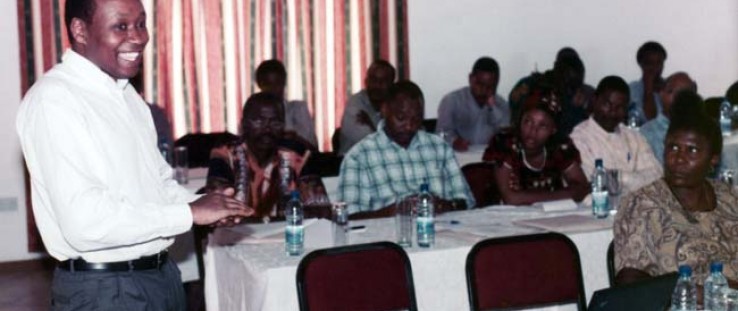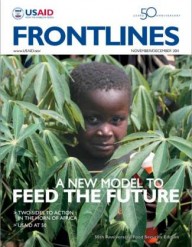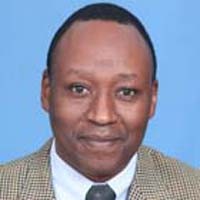 David Nyange conducts a seminar in entrepreneurship in 2004, when he was a senior lecturer at Sokoine University of Agriculture, Morogoro, Tanzania.
PHOTO COURTESY OF: DAVID NYANGE, USAID
David Nyange conducts a seminar in entrepreneurship in 2004, when he was a senior lecturer at Sokoine University of Agriculture, Morogoro, Tanzania.
PHOTO COURTESY OF: DAVID NYANGE, USAID
 David Nyange conducts a seminar in entrepreneurship in 2004, when he was a senior lecturer at Sokoine University of Agriculture, Morogoro, Tanzania.
PHOTO COURTESY OF: DAVID NYANGE, USAID
David Nyange conducts a seminar in entrepreneurship in 2004, when he was a senior lecturer at Sokoine University of Agriculture, Morogoro, Tanzania.
PHOTO COURTESY OF: DAVID NYANGE, USAID
David Nyange is somewhat shy, soft-spoken, and modest. But his unassuming manner stands in stark contrast to his many achievements and contributions in food security in Tanzania.
Nyange first became interested in agriculture as a boy growing up on his family’s coffee farm in the Kilimanjaro region of Tanzania. He was intrigued by the global aspects of cash crop production when his mother would tell him: “This year we might have a better return on the crop because there is frost in Brazil.”
As a youngster, he was also exposed to the potential of smallholder farmers’ cooperatives and credit schemes. His fees for secondary school were paid for by way of a credit program that the local coffee cooperative had developed for its members, including Nyange’s family. Members could borrow against expected income from their coffee crop harvests.
Nyange went on to study agricultural economics at the Sokoine University of Agriculture (SUA), an institution that was established in the 1960s with support from the first USAID program in Tanzania.
Feed the Future in Tanzania
After completing his bachelor’s degree in agriculture, Nyange stayed on at SUA as a tutorial assistant in the early 1990s. During this socialist period in Tanzania, information on western countries was scant, but one of the professors at SUA who had studied at Cornell University convinced Nyange to choose the well-regarded school for his graduate work.
With a research assistantship to help finance his graduate education, Nyange pursued a master’s degree in agricultural economics at Cornell, concentrating in econometrics and quantitative methods—approaches to statistical analysis that he needed to improve his research skills.
“Cornell was an exciting time for me,” Nyange recalls. “Tanzania was undergoing economic reform from a socialist state, ’ujamaa,’ to a market-based economy. At Cornell I was exposed to all these development theories, what has worked and what has not, and the experiences of other countries.” From Asia to Africa
While in the United States, Nyange attended a fresh produce convention that brought together the major players in agriculture and the retail chains, exposing him to the agribusiness industry’s value chain. At that time, the “Miracle of the Asian Tigers,” the rapid economic growth experienced by developing countries in Asia, was a buzz topic in the development circles and piqued Nyange’s interest in Asian agricultural economies and models that might apply to Africa.
He returned from the United States to teach at his alma mater, Sokoine, but still harbored a desire to better understand and compare different development approaches in Asian and western economies to draw lessons for Africa. In 1996, Nyange won a scholarship to Kyoto University in Japan, where he received a doctorate in agricultural economics with a specialization in international rural development. Even though he was in Japan, the focus of his research was food security and nutrition in Tanzania.
“I could have chosen to live and work in a developed country like the U.S.,” Nyange confides, “but Tanzania was undergoing many reforms and there was an opportunity to practice the things that I had learned and demonstrate that agricultural transformation and poverty reduction is achievable.”
Nyange resumed teaching and research at Sokoine University, but with a renewed purpose—to establish an MBA program in agribusiness at Sokoine—thus creating the national capacity to train professionals to progress the competitiveness of agriculture within Tanzania. By Nyange’s own account, it was formidable challenge. There was a perception within the university administration that there would be no demand for this degree. It took two years to advocate for the program, fill out the paperwork, and iron out legal and financial issues. Nevertheless, Nyange persevered, and by 2004, enrollment of students for the MBA in agribusiness began in earnest.
Two years later, Sokoine graduated the very first MBA recipients in agribusiness from a Tanzanian institution. Since then, successive graduating classes have joined the ranks of MBAs in agribusiness, prepared for careers in the private sector, where previously there had been a gap.
“I am optimistic that there is light at the end of tunnel,” states Nyange. “We are seeing more Tanzanian-owned agribusinesses emerging and they are creating markets for smallholder farmers and thereby addressing poverty reduction.”
Nyange also has worked with the National Bureau of Statistics in Tanzania to produce the first comprehensive national poverty report, which was published in 2001. The report, based on a household budget survey, provided indicators for measuring poverty in Tanzania, and stands as a baseline for monitoring poverty-reduction programs and interventions in the country. And, in collaboration with the International Food Policy Research Institute, Nyange used household survey data to measure the effect of public spending on poverty reduction in Tanzania. The study identified specific areas of spending that demonstrated the greatest impacts.
Nyange joined USAID in 2006, and was named a Foreign Service National of the Year in 2010.
“David Nyange is a tremendous asset to both USAID and the Feed the Future Initiative in Tanzania,” says Robert Cunnane, USAID mission director in Tanzania. “In addition to his knowledge, skills sets, and remarkable achievements, David’s long-term and tireless commitment to achieving food security in Tanzania is an inspiration to everyone who works with him.”










Comment
Make a general inquiry or suggest an improvement.